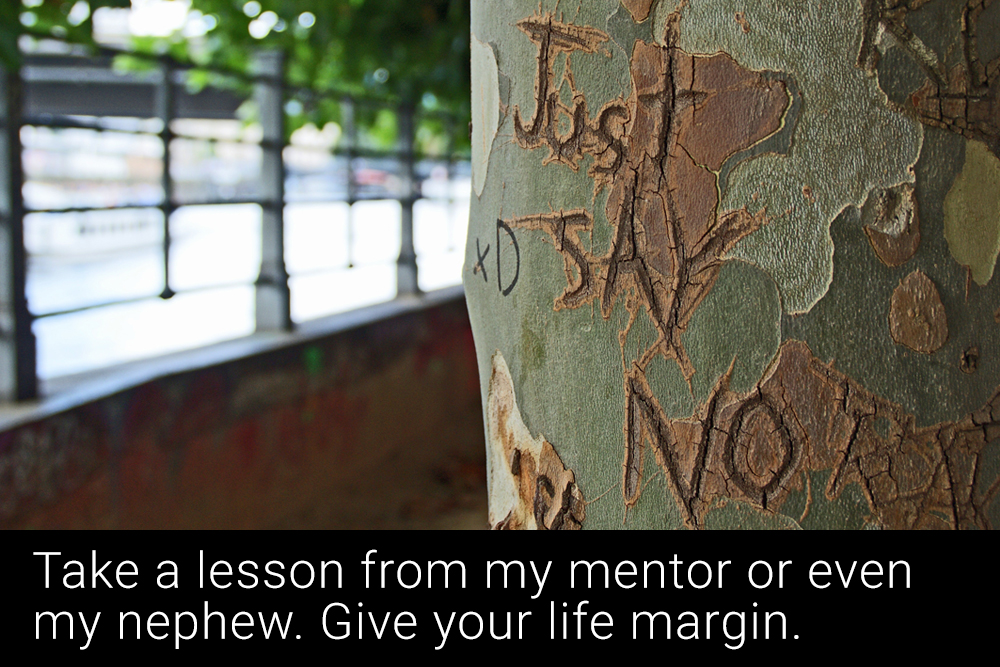My two-year-old nephew is a talker, and he will talk to anyone who is willing to listen. “I have a big red truck.” “That’s delicious.” “Uncle Bobby, sing that song.”
But of all the words he knows, his favorite word, as with any two-year-old, is simple – “No.”
“Do you want to eat dinner?”
“No.”
“Do you want to take a nap?”
“No.”
“Can Uncle Bobby have a hug?”
“No.” (sadly)
“No” is so much more than a word, though. It’s one of the first words we all learn. It’s an exclamation – a full thought and a firm expression of choice. In a world that limits one’s choices, two-year-olds quickly realize the power of “no” – and so should physicians.
Becoming a Yes Man (or Woman)
 Becoming successful has one common theme – hard work. Ask any successful person, and they will tell you that hard work, above all, has been critical to their success. For me, hard work meant saying “Yes!” when others wouldn’t. It meant adapting to every situation. I learned to become comfortable with the uncomfortable. I had to make things work, even if it meant sacrificing a little bit of myself along the way. Hard work meant studying in college when others were out with friends. It meant living my mid-twenties and early thirties with my nose in textbooks or taking care of patients while my friends started their jobs, their families, and their lives.
Becoming successful has one common theme – hard work. Ask any successful person, and they will tell you that hard work, above all, has been critical to their success. For me, hard work meant saying “Yes!” when others wouldn’t. It meant adapting to every situation. I learned to become comfortable with the uncomfortable. I had to make things work, even if it meant sacrificing a little bit of myself along the way. Hard work meant studying in college when others were out with friends. It meant living my mid-twenties and early thirties with my nose in textbooks or taking care of patients while my friends started their jobs, their families, and their lives.
But constantly saying “Yes!” has come at a cost. When the tests are over, and the goals have all been achieved, what’s left? Do we continue to set new goals? Does the thinking change? Is there a time when we can finally do whatever we want and not have to worry that someone may think we are unmotivated, or worse, not very good doctors? And will I ever pay back all of these student loans?
Physician Burnout
The first mention of “physician burnout” in the literature dates back to 1981. Fast forward almost 40 years, and you will find that over 300 peer-reviewed manuscripts were published in 2018 alone on the topic.
And, of course, everyone has their opinion on why physicians are getting so burned out. Student debt is at an all-time high. Electronic medical records have made physician’s lives miserable. Reimbursement rates are at best stagnant and at worst going down. Insurance companies, hospital administrators, and pharmaceutical companies have essentially stripped physicians of their ability to make decisions for patients and for themselves. And patients trust Dr. Google more than the physician sitting in front of them.
 There are probably myriad reasons why physicians are getting burned out, but here’s the one that seems the most reasonable. Physicians have all become “yes” people. We operate within a healthcare system that is not set up for our success, and yet we make ourselves uncomfortable to appease everyone but ourselves. We trick ourselves into thinking that we have no other choices, because that’s the way we made it through our training.
There are probably myriad reasons why physicians are getting burned out, but here’s the one that seems the most reasonable. Physicians have all become “yes” people. We operate within a healthcare system that is not set up for our success, and yet we make ourselves uncomfortable to appease everyone but ourselves. We trick ourselves into thinking that we have no other choices, because that’s the way we made it through our training.
An Illogical Fight Against Burnout
If you look at any modern-day medical schools or hospital systems, you’ll find courses and programs aimed at personal wellness. They will remind you to take care of yourself – eat right, exercise, and find time to do something you want to do every week. This logic, though, seems flawed.
 Physicians are facing higher rates of burnout, because we are being asked to do more with less time. See more patients, document for hours after work, and, if you find the time, have a loving family who you see every now and then. Oh, and eat right, go to yoga, and read a book for leisure in your free time.
Physicians are facing higher rates of burnout, because we are being asked to do more with less time. See more patients, document for hours after work, and, if you find the time, have a loving family who you see every now and then. Oh, and eat right, go to yoga, and read a book for leisure in your free time.
Free time?!? What free time? Our collective clan of yes men and women have already agreed to give most of our time away, so what sense does it make to try and shove hours of “wellness” into our schedule to prevent burnout? Burnout-preventing wellness activities are merely adding to our extensive lists of tasks. And it’s simply too much. It seems the more reasonable solution would be to start using my nephew’s favorite word – “No.”
Burnout-preventing wellness activities are merely adding to our extensive lists of tasks. And it’s simply too much. It seems the more reasonable solution would be to start using my nephew’s favorite word – “No.”
Remembering How to Say “No.”
In residency, I met a “no” man. He wasn’t the way you might think. People didn’t despise him or think he was lazy. It was quite the opposite. He was one of the hardest working physicians around. There was always time to work in same day patients. He freely volunteered his time for residents and the community. In fact, I didn’t realize he was a “no” man at the time. He seemed like a “yes” man, because you could always count on him to go the extra mile.
Over time, he became one of my most trusted mentors. He also happens to be one of the happiest physicians I’ve ever met. But he wasn’t always that way. He had to endure the same rigors we all faced in training. However, when he finished residency, he stopped. He took a breath. As he tells it, he started to give himself “margin.” He proactively began saying “No.”
 What’s margin? Well, he compared it to the guard rails on the highway. He guarded himself from burnout. He would work at 80% capacity. If an opportunity came up – giving an extra lecture, volunteering at a free clinic, or squeezing in a few extra patients into clinic – it was fine! His 80% would ramp up to 95% or 100% – never allowing himself to operate above capacity. He didn’t allow himself to feel dragged down by his job, or worse, his patients. He allowed himself to enjoy his work because of the margin he had built into his life. In allowing himself to say “No,” and in doing so, he paradoxically seemed like the hardest working physician around. He achieved what most are searching for – work-life balance.
What’s margin? Well, he compared it to the guard rails on the highway. He guarded himself from burnout. He would work at 80% capacity. If an opportunity came up – giving an extra lecture, volunteering at a free clinic, or squeezing in a few extra patients into clinic – it was fine! His 80% would ramp up to 95% or 100% – never allowing himself to operate above capacity. He didn’t allow himself to feel dragged down by his job, or worse, his patients. He allowed himself to enjoy his work because of the margin he had built into his life. In allowing himself to say “No,” and in doing so, he paradoxically seemed like the hardest working physician around. He achieved what most are searching for – work-life balance.
A Lesson from My Mentor and Nephew
We all have been conditioned to think we can do everything, all the time, and do it really well. Physicians are overachievers, and we shouldn’t have it work to our detriment.
So, take a lesson from my mentor or even my nephew. Give your life margin. Do the things you want. Live your life how you choose. Learn to say “No.” Heck, you may even be able to fit in a yoga class for your personal “wellness” every now and then with all of your free time.
Did you enjoy this post? Find more topics on Navigating Your Career here.

